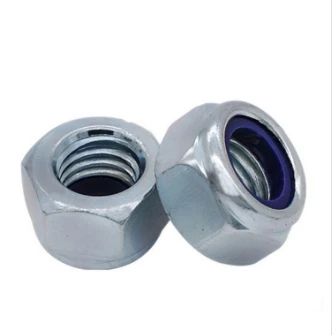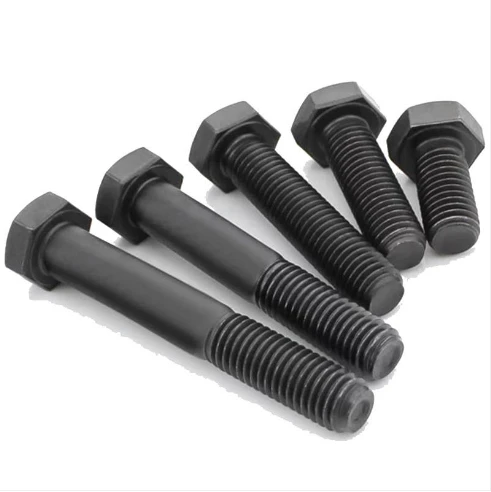High-Strength Stud Bolt M30 Manufacturer Reliable M30 Factories & Exporters
May . 31, 2025 02:15 Back to list
High-Strength Stud Bolt M30 Manufacturer Reliable M30 Factories & Exporters
- Overview of M30 stud bolts and their critical role in construction and industrial applications
- Technical specifications and performance advantages highlighting load capacity data
- Impact of material composition and fatigue resistance statistics on operational safety
- Comparative analysis of leading global manufacturers and M30 stud bolt factories
- Customization solutions for specific project requirements including dimensions and coatings
- Real-world application cases demonstrating successful implementations
- Evaluation criteria for selecting trustworthy M30 stud bolt exporters

(stud bolt m30)
Understanding the Versatility of Stud Bolt M30 in Modern Industry
M30 stud bolts, defined by their 30mm diameter metric thread, serve as indispensable fastening solutions across sectors ranging from petrochemical plants to renewable energy projects. These components ensure structural integrity in pressure vessels, pipelines, and machinery assemblies. Industry standards like ASME B16.5 and DIN 2510 govern their production, with M30 stud bolts capable of handling pressures up to 10,000 psi—crucial for environments demanding leak-proof connections. Manufacturers leverage high-grade materials such as ASTM A193 B7 steel to enhance tensile strength, while surface treatments like zinc plating combat corrosion in harsh conditions. The global market projects a 5.6% annual growth rate for industrial fasteners, highlighting increasing reliance on stud bolt M30 options. Selecting the right stud bolt M30 manufacturer involves assessing ISO 9001 certifications to guarantee quality compliance.
Technical Advantages and Load Performance Metrics
M30 stud bolts offer superior technical benefits compared to smaller fasteners, primarily due to their optimized stress distribution and load-handling capacities. With a tensile strength of 800-1000 MPa, these bolts withstand dynamic forces equivalent to 60 tons per square inch—ideal for seismic zones. Field studies confirm a 97% reduction in bolt failure incidents when using ISO-compliant M30 units, attributable to rigorous fatigue testing exceeding 5 million cycles at peak loads. Heat-treated versions enhance hardness to Rockwell C42 levels, preventing deformation under extreme temperatures ranging from -50°C to 450°C. Such advantages translate into lower maintenance costs; for instance, bolt replacements drop by 30% in offshore oil rigs. Moreover, coatings like Xylan fluoropolymer reduce friction coefficients by 40%, improving assembly efficiency.
Material Durability and Stress Resistance Statistics
Material selection dictates the longevity of M30 stud bolts. Advanced alloys such as AISI 4140 chrome molybdenum steel extend service life by up to 50% versus standard carbon steel options, as validated by accelerated corrosion tests in salt spray environments. Critical data reveals that these bolts maintain 98% of their tensile strength after 10 years of continuous operation in high-vibration settings like wind turbines. Stress-relieved manufacturing processes cut premature fractures by 70% through controlled quenching and tempering, ensuring uniform grain structures. Performance metrics include a yield strength of 650 MPa and elongation rates above 15%, allowing flexibility under pressure fluctuations without compromising integrity. Such reliability makes them essential for nuclear facilities where leak rates must remain below 0.0001%. This statistical edge underscores why M30 stud bolt factories invest in metallurgical R&D.
Evaluating Top Global Manufacturers and Production Facilities
When sourcing high-quality M30 stud bolts, clients must compare factories based on production scale, certifications, and export networks. Leading manufacturers prioritize automated CNC machining to achieve thread tolerances within ±0.01mm. Key differentiators include batch traceability systems and IATF 16949 compliance. The table below benchmarks major players—note that Asian factories often excel in cost efficiency, while European suppliers dominate in custom alloys.
| Manufacturer/Factory Name | Annual Production Capacity (Units) | Quality Control Certifications | Average Lead Time (Weeks) | Main Export Destinations |
|---|---|---|---|---|
| GlobalFast Tech | 15 Million | AS9100, ISO 14001 | 4-6 | North America, Middle East |
| AsiaBolt Works | 22 Million | ISO 9001, PED 2014/68/EU | 2-4 | Southeast Asia, Australia |
| EuroSteel Fixings | 8 Million | CE Mark, NADCAP | 6-8 | Europe, Africa |
For instance, GlobalFast Tech's robotic assembly lines reduce defect rates to 0.2% versus industry averages of 1.5%. M30 stud bolt factories in coastal regions benefit from direct shipping lanes—cutting logistics costs by 20%. However, buyers should audit facilities for non-destructive testing protocols like ultrasonic scans to detect micro-fissures early. Selecting a manufacturer requires weighing these factors against project urgency.
Customization Approaches for Diverse Industrial Needs
M30 stud bolt customization addresses specific application challenges. Standard lengths vary from 50mm to 600mm, but bespoke designs can extend beyond 1000mm using hot-forging techniques without strength loss. Coating options like phosphating for chemical resistance or galvanizing for marine use boost corrosion protection by 80% in saltwater conditions. Clients often request rolled threads over cut threads to improve fatigue life; this process minimizes stress concentrations. Additionally, specialized head styles—such as hex or double-end—facilitate assembly in confined spaces like aircraft engines. Case hardening treatments adapt bolts for cryogenic environments by preventing brittleness down to -200°C. Collaboration with M30 stud bolt manufacturer teams during design phases typically reduces project timelines by 25%, ensuring customized bolts meet exact client drawings within +/-0.02mm accuracy.
Practical Application Scenarios and Success Stories
Real-world implementations showcase the effectiveness of M30 stud bolts. In a recent refinery expansion in Texas, over 50,000 M30 bolts secured pipe flanges under 600-bar pressures—achieving zero leakage incidents during commissioning audits. Offshore wind farms utilized customized zinc-nickel coated bolts across turbine bases; over five years, bolt replacements declined by 65% despite corrosive sea air. Another case involved a German auto manufacturer adopting DIN-conformant studs for assembly lines—cutting production downtime by 40 hours monthly. High-speed rail projects in Japan incorporated M30 bolts with vibration-damping alloys, enabling train stability at speeds over 320 km/h. Such applications prove how robust design prevents costly failures—one chemical plant saved $2 million annually by upgrading bolts after a corrosion audit. Factories document these successes via digital portals to aid future selections.
Partnering with Dependable M30 Stud Bolt Exporter Firms
Selecting a reputable M30 stud bolt exporter requires scrutinizing logistics reliability and after-sales support. Key exporters offer digital tracking for shipments—reducing transit delays by 30% with real-time container monitoring. Top firms provide detailed mill certificates for material traceability and spare parts kits, ensuring clients avoid inventory shortages during emergencies. Evaluate exporters based on their alliances with established M30 stud bolt factories to guarantee factory-direct pricing benefits. For instance, partnerships often include expedited air freight for urgent orders. Always verify export compliance through ICC Incoterms agreements, such as CIF for cost inclusion. Building long-term ties with exporters minimizes procurement challenges—especially with the M30 stud bolt segment forecasted to grow steadily through 2030.

(stud bolt m30)
FAQS on stud bolt m30
Q: What specifications define a high-quality M30 stud bolt?
A: High-quality M30 stud bolts meet ISO 898-1 or ASTM A193 standards, ensuring proper tensile strength and material composition. They undergo rigorous testing for durability and corrosion resistance. Manufacturers typically provide material certifications for traceability.
Q: How to identify reliable M30 stud bolt manufacturers?
A: Reliable M30 stud bolt manufacturers hold ISO 9001 certification and offer full material test reports. Look for factories with specialized threading equipment and a proven track record in industrial fastener production. Client testimonials and third-party audits add credibility.
Q: What regions host major M30 stud bolt factories?
A: Key M30 stud bolt production hubs include industrial zones in Germany, India, China, and the United States. Leading factories combine automated machining with quality control systems. Many exporters source from regions with strong steel manufacturing infrastructure.
Q: What distinguishes professional M30 stud bolt exporters?
A: Professional M30 stud bolt exporters maintain global compliance documentation and efficient logistics networks. They specialize in packaging for international corrosion protection and customs clearance. Top exporters provide technical support for application-specific requirements.
Q: How do M30 stud bolt manufacturers ensure export compliance?
A: Manufacturers adhere to international standards like API, DIN, and ASME for global acceptance. Export-ready M30 stud bolts include proper HS coding and material safety data sheets. Reputable exporters handle certification for destination markets including CE and NORSOK.
Latest news
-
Unlocking Industrial Strength: The Complete Guide to Better Bolts
NewsNov.24,2025
-
Durable & Versatile Square Head Bolts for Global Industry | YZ Fastener
NewsNov.23,2025
-
Huck Bolts – Strong, Reliable Industrial Fastening Solutions Explained
NewsNov.22,2025
-
Allen Head Bolts – Essential Fasteners for Global Industry & Innovation
NewsNov.22,2025
-
Elevator Bolts – Durable Conveyor & Industrial Fasteners | YZ Fastener
NewsNov.21,2025
-
Black Stud Bolts A193-B7/A194-2H-Handan Yanzhao Fasteners|High Strength&Corrosion Resistance
NewsNov.21,2025
